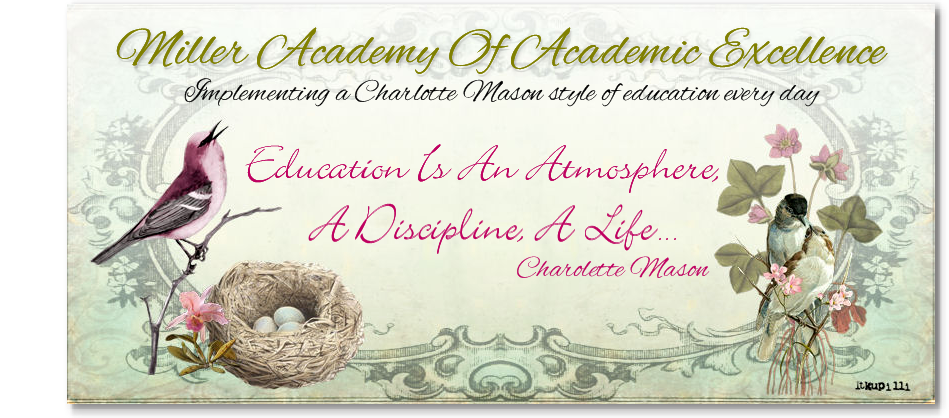Saturday, June 2, 2012
Shouldn’t a child’s education include lots of science experiments?
“No-eyes come home bored; he has seen nothing, been interested in nothing: while Eyes is all agog to discuss a hundred things that have interested him. As I have already tried to point out, to get this sort of instruction for himself is simply the nature of a child: the business of the parent is to afford him abundant and varied opportunities, and to direct his observations, so that, knowing little of the principles of scientific classification, he is, unconsciously, furnishing himself with the materials for such classification. It is needless to repeat what has already been said on this subject; but, indeed, the future of the man or woman depends very largely on the store of real knowledge gathered, and the habits of intelligent observation acquired, by the child. ” Charlotte Mason vol 1 pg 265
I loved my high school chemistry class with all of its experiments and chemical formulas. I knew this was the career path I wanted to take. I entered my university with the intention of getting a degree in Chemistry. What I found out midway through was that I loved teaching more. I graduated with a Bachelors of Science and a teaching degree with a science major and math minor. I did lots of experiments with my students…or so I thought.
All of us were taught the scientific method whether we remember it or not.
Scientific Method
Observation/Research
Hypothesis
Prediction
Experimentation
Conclusion
Did you notice where the scientific method begins? It starts with observation and research of the natural world, nature study! It is the foundation. This is the missing link in traditional education. The rest of the method flows from that. You cannot have a scientific method if you do not have its starting point. In my previous post “Is nature study enough in the younger years?” I explained that nature study is the starting point of all real science. If you haven’t read it, please do.
You probably have at least one experiment book on your shelf. You can thumb through it to pick out an experiment for your study of sound or motion. The experiment would then provide the hypothesis, the steps for the experiment and then it will draw the conclusion for you or tell the student why it works. This is somebody else using the scientific method to create an experiment. Somebody else has already drawn the conclusions for the child. The student is just copying somebody else’s preprocessed information, very much like following a recipe. This is not a science experiment. What your child has learned to do is follow directions but there is very little real science in this, it is instead another form of dispensing knowledge.
Wouldn’t it be better for the child to actually do the scientific investigation himself? How does this look? Let’s look at example of a child directed experiment that took place in my home.
Observation and Research
Caleb noticed a potato in the pantry had sprouted eyes and he wanted to know what they were and why they were there. I explained what the eyes of the potato were and that if you cut them off with some of the potato they would grow.
Hypothesis
“I am going to plant it in the pot,” he said.
“If you plant one in the garden as well, which one do you think would grow better?” I asked.
Prediction
“I think the one in the garden will because it has more space for the roots and better soil to grow in,” he predicted.
Experimentation
He planted potato eyes in both places. He kept his potatoes well watered and watched them grow.
Conclusion
He found that the potted potato, although it grew faster, did not get very big. The potatoes from this plant were small. His garden plant took longer to grow and yielded a much bigger plant with bigger potatoes.
Nothing was written down and no display board was made. It was very natural and informal, but each step in the method was there. Not all of his investigations include every step in the scientific method and that is acceptable. We have also done experiments out of one of our experiment books in the past. Do you think he remembers them? No, because there was nothing for him to connect to the information. A fun experiment copied from a book is not enough for a child to connect to the ideas and concepts. In contrast, he will always remember his potato experiment. Later, when he learns about plant adaptations, he will have an experiential understanding to the concept.
God has created a beautiful world for us to live in. He has also created us in His image, special in His creation. He has given us a desire to know Him. The study and investigation of His creation gives us a peak into the nature and character of our Creator. A child’s education should include scientific investigation but not in the way we have been conditioned to think of science experiments. Let his investigations be an expression of the child’s own observations of nature and his natural curiosity. Then he will be furnished with a storehouse of real knowledge gathered, and the habits of intelligent observation acquired.
Labels:
Charlotte Mason,
Education,
experiments,
Homeschooling,
Science
Subscribe to:
Post Comments (Atom)


What a wonderful way to explore God's creation!
ReplyDeleteI would agree Kelly. I just love this natural approach to learning!
ReplyDelete